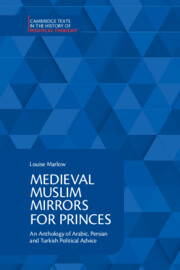Book contents
- Medieval Muslim Mirrors for Princes
- Cambridge Texts in the History of Political Thought
- Medieval Muslim Mirrors for Princes
- Copyright page
- Dedication
- Contents
- Figures and Maps
- Preface and Acknowledgements
- Conventions
- Abbreviations
- Part I Introduction
- Part II Texts
- 5 The Nature of Sovereignty
- 6 The King’s Person and Character
- 7 Foundations of Royal Authority and Principles of Governance
- 8 The Practice of Good Governance
- 9 Problems in the Kingdom and Their Remedies
- Appendix Index of Qurʾanic References and Quotations
- Glossary
- Bibliography
- Index
- Cambridge Texts in the History of Political Thought
9 - Problems in the Kingdom and Their Remedies
from Part II - Texts
Published online by Cambridge University Press: 15 January 2023
- Medieval Muslim Mirrors for Princes
- Cambridge Texts in the History of Political Thought
- Medieval Muslim Mirrors for Princes
- Copyright page
- Dedication
- Contents
- Figures and Maps
- Preface and Acknowledgements
- Conventions
- Abbreviations
- Part I Introduction
- Part II Texts
- 5 The Nature of Sovereignty
- 6 The King’s Person and Character
- 7 Foundations of Royal Authority and Principles of Governance
- 8 The Practice of Good Governance
- 9 Problems in the Kingdom and Their Remedies
- Appendix Index of Qurʾanic References and Quotations
- Glossary
- Bibliography
- Index
- Cambridge Texts in the History of Political Thought
Summary
This final chapter explores mirror-writers’ diagnoses of political and social ills, and their proposed remedies for them. They range from kings’ propensities to indulge to excess in food, drink and sex, to the hazards of abandoning well-established and highly regarded practices, to external enemies’ seizing advantage at moments of internal weakness. The three extracts show shared concerns, especially with heterodoxy, portrayed as a mask for political dissent, as well as idiosyncratic concerns. Many of the narratives are presented as cautionary examples. Collectively, the texts convey the precarious nature of royal power and its limits. They are drawn from al-Thaʿālibī, Ādāb al-mulūk; Niẓām al-Mulk, Siyar al-mulūk; and al-Ṭurṭūshī, Sirāj al-mulūk.
- Type
- Chapter
- Information
- Medieval Muslim Mirrors for PrincesAn Anthology of Arabic, Persian and Turkish Political Advice, pp. 259 - 312Publisher: Cambridge University PressPrint publication year: 2023

